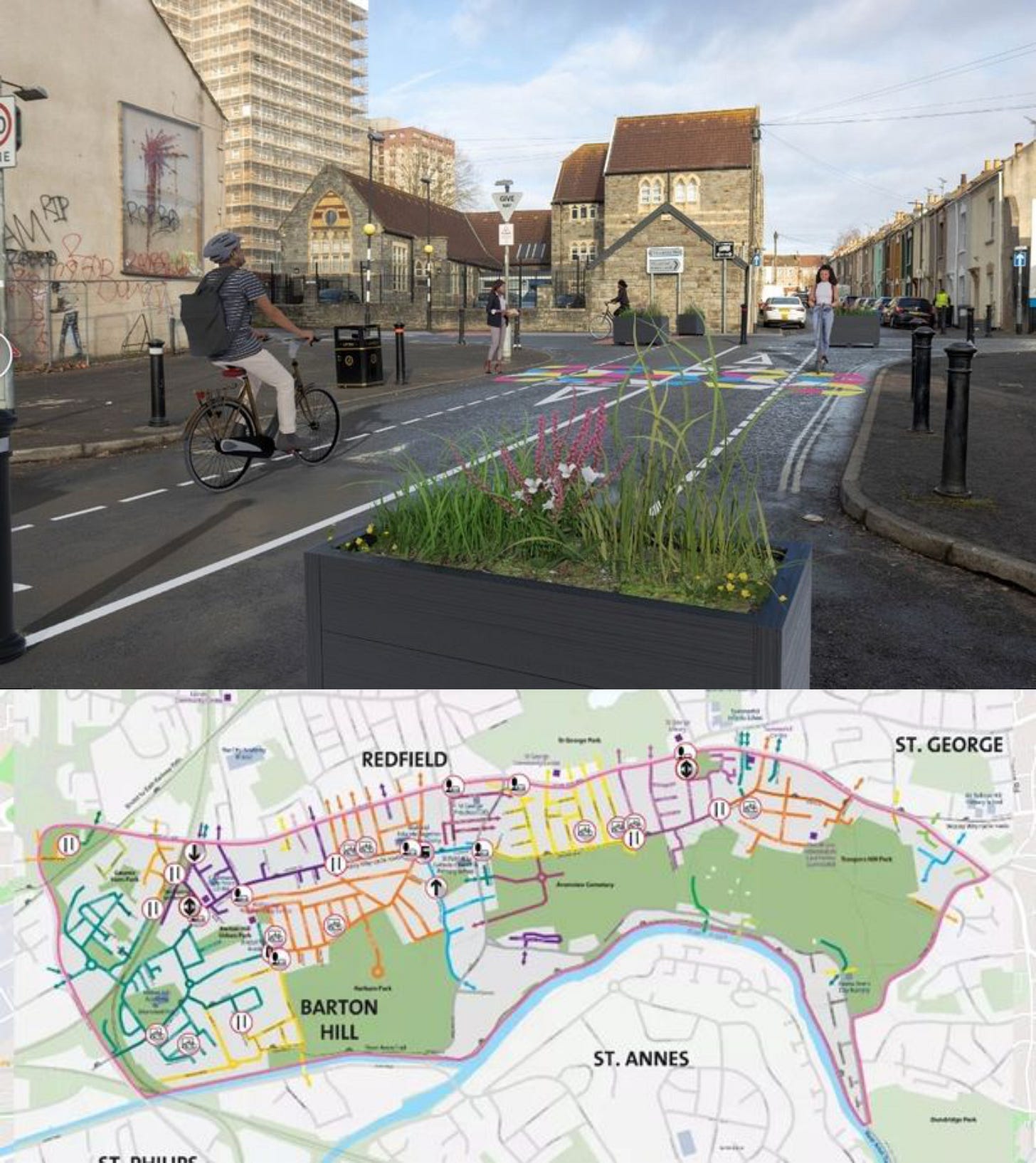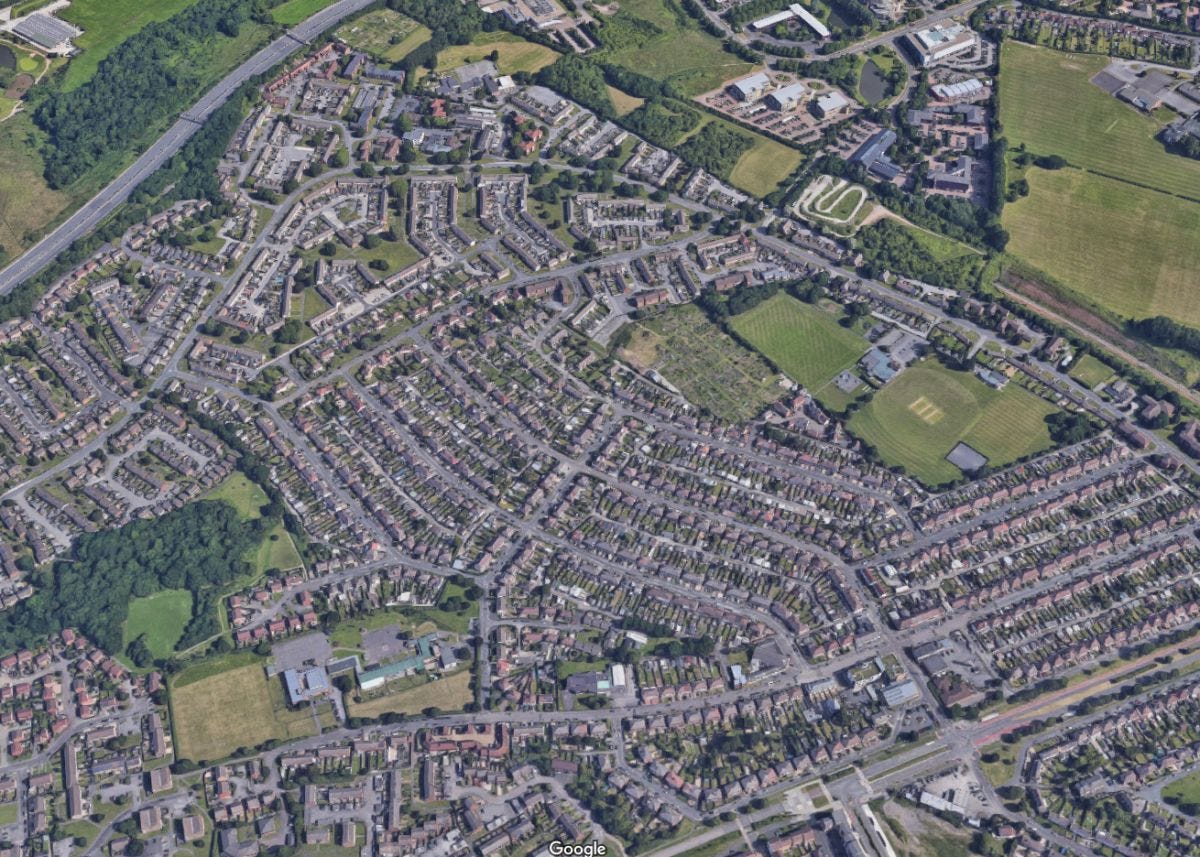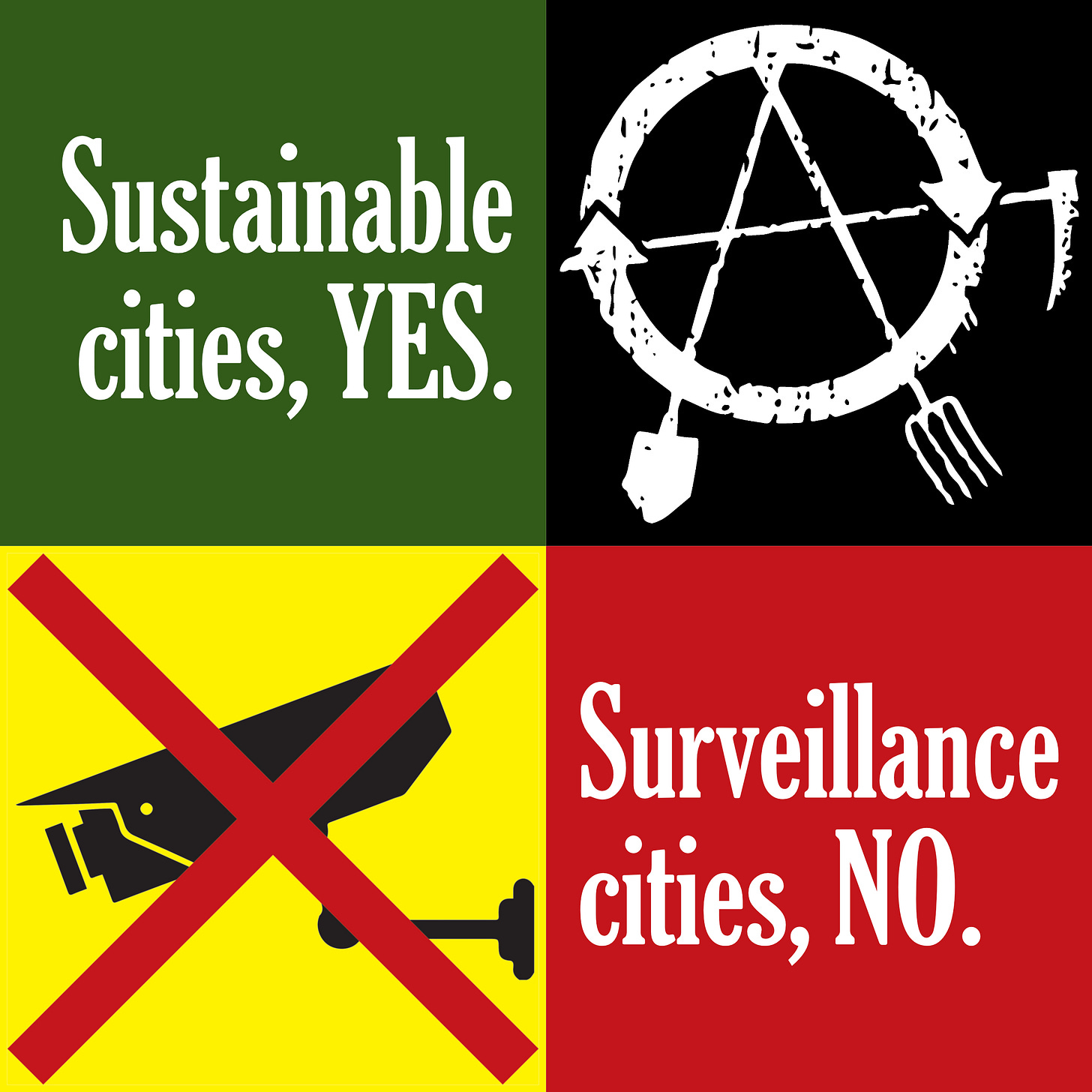Fifteen minute neighbourhoods, Low Traffic Neighbourhoods (LTNs) and Clean Air Zones (CAZs) are causing a lot of controversy. I've written more than I care to remember about the issues involved. This is one of the more recent overviews I've posted up: Fifteen minute cities - the debate continues… 19.4.23. With the implementation of a trial 'liveable neighbourhood' scheme in the east of Bristol - Will it work or will it cause more problems? 5.5.23 - the discussion feels like it's getting more heated but also, not getting anywhere near a resolution.
I've mentioned this before but feel that in the interests of transparency, it should again be pointed out that neither of us behind this project drive. We've always got around by walking, using public transport, occasionally getting a lift and very occasionally getting a taxi. We could tell you a lot about crap public transport and piss poor pedestrian infrastructure if you really wanted to hear it, particularly where we live in the Avon region! So when we criticise fifteen minute neighbourhoods, LTNs and CAZs, it's not from a position of us being so called 'petrol heads', it's because we can see some pretty blatant contradictions between the positive aspiration of having a lot of life's amenities within a fifteen minute walk, and the reality of the way these schemes are being imposed. We also criticise the concept of fifteen minute neighbourhoods from the hassle we had in trying to find one, where a lot of what we needed was actually within a fifteen minute walk, when we relocated from Thurrock to Keynsham last year.
As I've written more times than I care to remember, we've had decades of planning policy that has assumed near universal car ownership, particularly in the outer suburbs and overspill towns. When this is combined with changes in working and shopping patterns over the decades that have led to the rise of supermarkets in locations where a lot of people have no other option that to drive to get to them, it's no surprise that there's a lot more traffic on the roads these days. That's because we live in a society where having a car is not a symbol of so called 'freedom', it's pretty much a necessity for the majority of people. Particularly if they live in the outer suburbs and overspill towns.
I get the impression that a number of the advocates of fifteen minute neighbourhoods are work from home middle class professionals living in inner suburban areas where a lot of life's amenities are actually within a fifteen minute walk of where they live. The kind of people who during the lockdowns of 2020/21, had many of the necessities of life delivered to them by precariously employed delivery workers. The kind of people who have no idea of how ordinary working class people have to lead their lives. The kind of people who have no concept of what life is like in far flung suburbs such as Stockwood and Whitchurch or overspill towns such as Yate. Last but not least, the kind of people who hurl the accusation of 'conspiracy theorist' at anyone questioning the validity of fifteen minute neighbourhoods, LTNs and CAZs.
I have questions for these people...
How is slapping lines on a map, sticking up surveillance cameras everywhere and implementing a fine structure for people making the 'wrong kind' of journeys actually going to deliver neighbourhoods where many of life's amenities are actually within a fifteen minute walk?
What have you got to say to those who are disabled or have caring responsibilities that make them totally dependent on a car when a badly implemented LTN or CAZ screws up their ability to move around?
What have you got to say to those who feel vulnerable using public transport or walking and who would be pretty much confined to their homes if they were restricted in how they use their cars?
On top of the aforementioned fifteen minute neighbourhoods, LTNs and CAZs, there's this 'aspiration' for car use across the Bristol region to halve by 2030 if current net zero carbon targets are to be met: An impossible target? 23.3.23.
This prompts some more questions...
In a region where bus and train services are acknowledged to be pretty shite, how will what passes for a public transport network cope with a massive surge in demand as people are forced away from using their cars?
Will it be the case that as demand well exceeds capacity, some kind of travel rationing for public transport would have to be implemented to ensure 'essential workers' get priority?
Would those supporting the target of reducing car travel in half by 2030 be happy to support the rationing of access to public transport which would severely restrict the movement of many people?
As meeting a target such as this would require top down, imposed restrictions that would be as least as drastic as those brought in to supposedly deal with Covid, would you be happy supporting the subsequent punishments and restrictions on freedom for those defying or unable to comply with them?
It has been mentioned to me by a number of people that there are alternative means of travel that would in their view, play a role in reaching the target of net zero carbon. These range from electric cars through to electric bikes and onto what has been dubbed 'active travel' which is just a fancy term for cycling and walking. Electric cars are still very much an experimental technology with a lot of hurdles to overcome. Hurdles that once you do a bit of digging, are widely acknowledged: Revealed: how US transition to electric cars threatens environmental havoc 24.1.23.
This prompts yet another question...
Given the metals and minerals that go into the batteries and other systems required to power an electric car, and the social and environmental costs of extracting them, can you honestly say with your hand on your heart that these cars will be the answer to the question of the future of movement?
'Active travel' is a lovely, positive sounding buzz phrase. Really, who could possibly object to more people choosing to cycle and walk to get around?
There are questions as to how this fits into bigger picture...
Do those supporting 'active travel' recognise that it will only be a viable option if it goes hand in hand with a massive reconfiguration of our outer suburbs and overspill towns to ensure that as many of life's amenities as possible are actually within a fifteen minute walk?
If as is hoped they actually do recognise this, how would those supporting 'active travel' propose to positively sell the idea to people who have become conditioned to relying on their cars to get around?
As stated at the start of this piece, the discussion around fifteen minute neighbourhoods, LTNs and CAZs has become very polarised. Those raising legitimate concerns about how they will be implemented have all too often, been wrongly dismissed as so called 'conspiracy theorists'. That's a lazy term of dismissal which has been bandied about by those wishing to avoid having their views seriously challenged and being obliged to actively defend them. I saw way too much of this during the Covid 'crisis' in 2020 and 2021 when anyone questioning the narrative we were being fed was instantly dismissed as a 'conspiracy theorist'. If they feel they're being put under pressure, all they have to do is label those raising questions as 'conspiracy theorists' and hey presto, they get away with not having to defend their views!
A final question...
Will those advocating the reduction of car use and restriction on movement in the name of reaching net zero carbon actually engage with people's legitimate concerns or are we condemned to perpetual name calling and polarisation instead?
For the record, I recognise that we live on a finite planet and that at some point, we need to think about how we live and move around in a way that recognises the constraints that the planet we live on will eventually impose upon us. I dealt with this at some depth in the latter part of this piece: The future of movement on a finite planet 20.2.23. I fully realise that at some point, we will have to change the way we live and move around so we all enjoy a more sustainable and satisfying future. What I also recognise is that this has to be done in a way that's equitable so that we don't end up with a situation where the vast majority of the population is effectively locked down while the elites continue to swan around and live as they please.
That's why in this piece, I've raised a lot of questions. There are probably many more I could raise and at some point in the near future, I may well do that. I realise that I'm probably being a bit provocative in the way I've raised the questions in this piece. I've done that because I want to provoke the honest, wide ranging and fair debate that's needed about the future of how we live and move around on a finite planet. I've also done it because I want to challenge the way some actors are advocating what are openly authoritarian measures to control the way people live and move around, supposedly for the good of the planet. This discussion can only happen if those hurling accusations of 'conspiracy theorist' at anyone asking these difficult questions rein it in for a bit and actually engage in some good faith discussion.
Dave - the editor











Net zero carbon is code for net zero humans. Everything these clowns try to push on humanity is based on our ultimate destruction. Clean air and water are certainly desirable and the solution is to go after the polluters at the source, not reinvent how a person is to live a functional life.